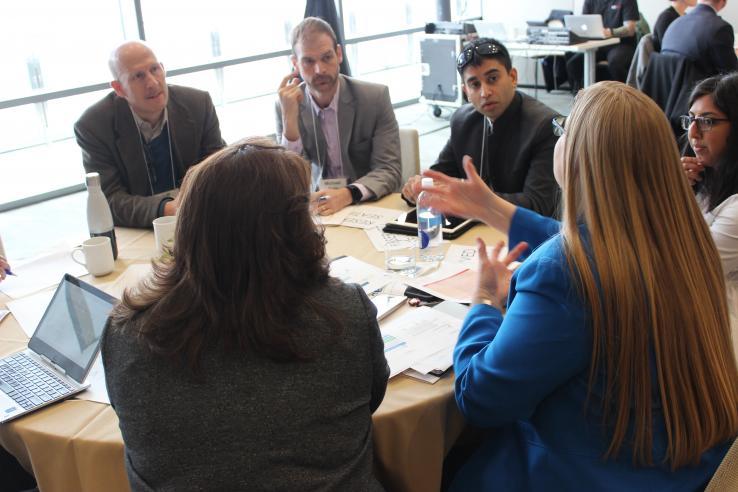September 2020 North America Newsletter

Good afternoon,
State and local governments often work on the frontlines of social policy. They are attuned to how policy questions uniquely manifest for their communities and are often best positioned to provide an immediate, context-relevant response to the specific needs of their residents. J-PAL North America has been working with state and local government leaders for the past five years through our State and Local Innovation Initiative to support these efforts by evaluating programs and policies to determine which approaches best foster upward mobility.
This year, we are collaborating with government leaders to develop a learning agenda that identifies how policy-relevant research can help state and local governments foster mobility from poverty within their communities. Going forward, we will continue to work with our partners, researchers, and other stakeholders to identify overlapping policy areas, gaps in the evidence, and what a robust learning agenda for the future should look like. We will also be giving voice to the perspectives of the various stakeholders involved through J-PAL Voices, a new podcast series that will take a close look at the promise and impact of summer jobs programs in the United States. Through interviews with advocates and program coordinators, researchers, and most importantly, the participants themselves, we will bring you the stories behind the impact and explore how such programs can facilitate mobility from poverty.
One policy priority for state and local governments is education, where millions of students in the United States are behind grade level—a number that will only continue to grow as COVID-19 disrupts the learning landscape. To support education leaders and policymakers, we have developed a new synthesis of the evidence on tutoring programs, which found that tutoring is consistently effective at helping students learn. We hope it will serve as a resource for those working to combat the COVID-19 slide, support student learning, and minimize the growth of academic disparities.
Expanding our focus beyond education, we continue to explore ways to connect with our partners, even if we are forced to do so virtually. Our State and Local Innovation Initiative is convening a webinar series to discuss pressing policy issues facing state and local government agencies related to COVID-19 testing, racial equity, and climate change. The first webinar in the series takes off from one of our core values: to build inclusive and collaborative relationships by bringing in a wide range of perspectives. We hope you can join us.
From all of us at J-PAL North America, we hope you and your loved ones are safe and healthy.
Rohit Naimpally
State and Local Innovation Initiative Manager, J-PAL North America
New webinar series launches on September 30 to chart the next decade of evidence generation in state and local government
J-PAL North America’s State and Local Innovation Initiative is launching a free webinar series to explore pressing policy and research priorities facing state and local governments. Join our first webinar, Incorporating qualitative research and interdisciplinary perspectives in randomized evaluations, on September 30 at 11:30 am ET to discuss how interdisciplinary thinking—and building inclusive and collaborative relationships—can be incorporated into developing and implementing evaluations. Speakers include Stefanie DeLuca (Johns Hopkins University), Bruce Sacerdote (Dartmouth College), and Sarah Oppenheimer (Opportunity Insights). Additional webinars in the series will discuss how state and local governments and researchers can develop evaluations related to the COVID-19 pandemic, racial equity, and climate change and environmental justice. Register today to hear actionable insights for how state and local governments can use data and evidence to advance their policy priorities and how researchers can partner with government leaders to develop and implement randomized evaluations.
How state and local governments can promote upward mobility through research
Building upon five years of partnership with state and local governments, J-PAL North America is working to develop a learning agenda that summarizes the core government research priorities. The Mobility from Poverty Learning Agenda, based on 124 research proposals submitted to the State and Local Innovation Initiative since 2015, will summarize the core research priorities from state and local governments, identify areas for further research, and provide guidance on how to translate the learning agenda into concrete action. As part of this work, the Initiative is developing a podcast series, J-PAL Voices: The Impact and Promise of Summer Jobs in the United States, that explores how summer jobs programs fit into the broader goals of fostering mobility from poverty. You will hear from advocates and program coordinators, researchers, and most importantly, the participants themselves about how these programs made a difference in their lives and why they should matter for all of us. Check out the podcast trailer and stay tuned for more episodes in the coming weeks.
Tutoring programs identified as critical tool to combat COVID-19 learning loss
A review of rigorous research finds that tutoring is a proven method to help children catch up in school. This finding is particularly important today as the COVID-19 pandemic disrupts the learning landscape across the United States and sets the stage for widespread learning loss. As state and local governments and schools work to stabilize and adapt, identifying effective methods to help students catch up will be crucial. J-PAL North America’s new Evidence Review, “The transformative potential of tutoring for PreK-12 learning outcomes: Lessons from randomized evaluations,” summarizes a meta-analysis of 96 randomized evaluations of tutoring programs. The findings not only point to tutoring as one of the most impactful tools available for improving learning, they also indicate which forms of tutoring are most effective and for whom. Insights from this review can support education leaders as they work to effectively combat COVID-19 learning loss and the growth of pre-existing disparities in educational access and achievement.